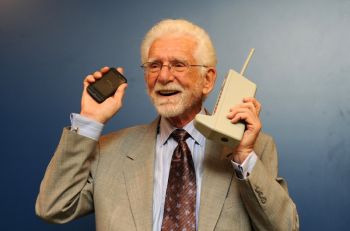Illinois Tech Project Receives $1.6 Million Contract to Develop System for Authorship Attribution and Anonymization
AUTHOR aims to use natural language processing and machine learning for identification, while also allowing for robust anonymization in critical contexts

CHICAGO—May 18, 2023—Researchers at Illinois Institute of Technology have secured a $1.6 million contract to develop a groundbreaking system for authentic authorship attribution and anonymization. Using natural language processing and machine learning, the program, known as AUTHOR, promises to create “stylistic fingerprints” for reliable identification, while also providing robust solutions for anonymization. With broad applications including counterintelligence, combating misinformation, and even investigating the origins of ancient religious texts, the project marks a significant leap in computational analysis.
The project—a collaboration with Charles River Analytics, Rensselaer Polytechnic Institute, Aston University, and the Howard Brain Sciences Foundation—has received the funding from an $11.3 million pool allocated by the Human Interpretable Attribution of Text Using Underlying Structure (HIATUS) program of the Intelligence Advanced Research Projects Activity (IARPA), a research organization within the Office of the Director of National Intelligence.
AUTHOR (Attribution, and Undermining the Attribution, of Text While Providing Human-Oriented Rationales) aims to accurately capture the unique writing styles of authors through a sophisticated blend of natural language processing and machine learning. The project is being led by Illinois Tech’s Shlomo Argamon, professor of computer science and chair of the Department of Computer Science, and Kai Shu, Gladwin Development Chair Assistant Professor of Computer Science.
“There are a number of different types of authorship attribution tasks,” says Argamon, who has more than 25 years of research experience in the field. “One is where there is a particular author who we want to identify in different texts. Another is where we have a specific text which we want to attribute to one of a number of candidate authors. A third is simply to determine when two texts have been written by the same person or not.”
Argamon and Shu also aim to address the rising urgency caused by malicious online activities and machine-generated misinformation.
“With large language models, such as GPT-3, it is possible that human-like texts can be generated from these ’bots,” says Shu. “Our work will explore deep generative models and style transfer techniques to explore the boundary of human-written and machine-generated texts.”
One of the central challenges the team seeks to overcome is the limitations of current methods of authorship analysis and obfuscation. The issue lies partially in identifying authorship when the questioned document differs in type from the known documents, given the inherent stylistic variations between different forms of writing, such as a personal letter, an academic article, or a short story.
“The best current methods do very poorly when test documents are of a different type than the training documents,” says Argamon. “We will develop author models that incorporate such stylistic domain dependence to enable more generally effective attribution.”
The project will also tackle the challenge of authorship obfuscation, maintaining the meaning of the text while altering the style. The team will integrate deep learning with semantic knowledge representation to generate text that maintains the original content meaning while changing the style. This dual functionality—attribution and obfuscation—sets AUTHOR apart from existing algorithms.
Unlike existing systems, AUTHOR will provide a clear rationale for its author identification systems, adding another layer of transparency and reliability to the project.
Photo: Shlomo Argamon and Kai Shu
Illinois Institute of Technology
Based in the global metropolis of Chicago, Illinois Tech was born to liberate the collective power of difference to advance technology and progress for all. It is the only tech-focused university in the city, and it stands at the crossroads of exploration and invention, advancing the future of Chicago and the world. It offers undergraduate and graduate degrees in engineering, computing, architecture, business, design, science and human sciences, and law. Illinois Tech students are guaranteed hands-on experiences, personalized mentorship, and job readiness through the university's one-of-a-kind Elevate program. Its graduates lead the state and much of the nation in economic prosperity. Its faculty and alumni built the Chicago skyline. And every day in the living lab of the city, Illinois Tech fuels breakthroughs that change lives. Visit iit.edu.
College of Computing
Illinois Tech created the College of Computing in 2020 as part of an effort to drive Chicago’s thriving tech ecosystem by educating a future diverse workforce that is rigorously trained in data and computation. Illinois Tech is home to the Midwest's only Bachelor of Science in Artificial Intelligence degree, and the numerous cybersecurity and intelligence pathways at Illinois Tech explore not only the deep foundations of fast-growing fields of computer science, but also emphasize societal ethics in developing this technology. The United States Department of Homeland Security and the National Security Agency have designated Illinois Institute of Technology (Illinois Tech) as a National Center of Academic Excellence in Cyber Defense Education. The university’s Center for Cyber Security and Forensics Education (C2SAFE) is at the core of Illinois Tech’s designation. Additionally, the center is a member of the United States Strategic Command (USSTRATCOM) Academic Alliance and North American Defense and Security Academic Alliance (NADSAA).
Media contacts
Kevin Dollear
Communications Manager
Illinois Institute of Technology
Cell: 773-860-5712
kdollear@iit.ed




